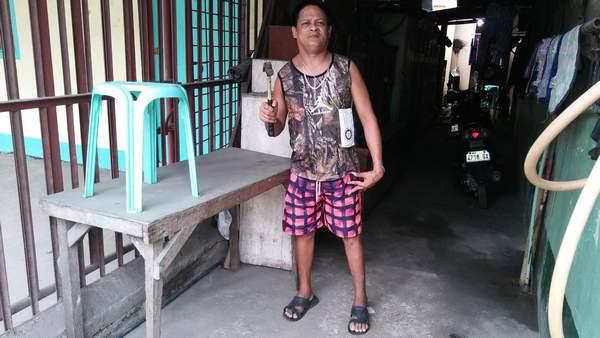
Finding hope amid adversities
(Conclusion of CDN’s three-part series tracing the contributions of persons with disabilities who serve the community with joy and dedication despite their handicaps.)
He used to feel worthless in view of a handicap that afflicted him since birth.
“Usahay maghinoktok ko ngano naingon man ko niini. (Sometimes, I wonder why I have this kind of condition),” said Jesus Eyana.
The 47-year-old native of Bohol is disabled by cerebral palsy which made him incapable of deliberate movement and speech.
Since some areas of his brain are damaged, he could barely control his head and hands from moving while words come out of his mouth a bit delayed than normal.
When walking, Eyana’s knees point inwards and cross—an evident sign of an ailment which brought him humiliation and tears as people made fun of him.
“Naay higayon nga makahuna-huna ko nga wala na koy paglaum aning kalibutana. Pero dili naman mautro ang tanan. (There were times when I felt hopeless. But I realized I could not change what is already there),” he said.
Jesus Eyana accepts carpentry jobs to earn a living. Though born with cerebral palsy, Jesus Eyana does everything he can to be productive and to live his life.
Overcoming limitations
Instead of wallowing in misery, Eyana took up a one year course at the Area Vocational Rehabilitation Center (AVRC), a facility managed by the Department of Social Welfare and Development ( DSWD ) in Barangay Labangon, Cebu City.
In 2012, he finished carpentry, specializing in furniture and cabinet making, and became one of AVRC’s most outstanding graduates.
“Dili babag ang akong kakuli-an sa lawas. Duna diay kay mahimo bisan kon naa kay deperensya ba. Dili angayan magpakawala og paglaum (Any physical disability is not a hindrance to success. One can do something good even if he or she has a disability. We should not lose hope.),” he said.
“ Adunay gihatag ang Ginoo. Makakita ra tag unsay bagay natong trabahoon. Bisan unsa ang atong depekto, dili man ta pasagdan sa Ginoo (The Lord has given something for each one of us. We will always find work that is fit no matter what defect we have, God will take care of us.),” Eyana added.
Since his graduation, Eyana has been receiving orders from people to assemble cabinets, dividers and even home furnitures.
He has also found work as a utility man in a Cebu-based company for some time now.
Eyana is hoping to have a stable job that can sustain his needs as well as those of his wife, a blind masseuse, whom he met at the AVRC.
“Gusto ko motrabaho og makatabang sa mga nanginahanglan. (I want to work and at the same time help those in need),” he said.
Unified support
For Cebu Vice Gov. Agnes Magpale, it is about time that local government units (LGUs) put their acts together in order to advance the rights of persons with disabilities (PWDs).
“There must be programs for them because if only they are well taken care of and given a chance, they can be productive members of society,” she said in an interview.
In her staff at the Provincial Capitol, Magpale has a deaf mute and a female employee with only one hand.
She also supervises blind scholars of the Cebu provincial government.
Magpale called on Cebu’s local officials to give special attention to their constituents with disabilities.
“The PWD sector is very important in our society yet they have been neglected. I’m hoping that they would be given the attention that they deserve,” she said.
Same rights
Under Republic Act 7277 or the Magna Carta for Disabled Persons, PWDs “have the same rights as other people to take their proper place in society.”
“They should be able to live freely and as independently as possible. The rehabilitation of the disabled persons shall be the concern of the government in order to foster their capability to attain a more meaningful, productive and satisfying life,” the law states.
“A qualified disabled employee shall be subject to the same terms and conditions of employment and the same compensation, privileges, benefits, fringe benefits, incentives or allowances as a qualified able-bodied person,” the law further adds.
Anyone who violates the law protecting the PWDs shall face imprisonment between two to six years or a fine of not less than 100,000 but not more than 200,000 or both.
Lawyer Jose Glenn Capanas, president of the Integrated Bar of the Philippines (IBP) Cebu City chapter, called on people to respect persons with disabilities instead of discriminate them.
“We need to have a deeper understanding about PWDs laws. By knowing their rights, we’re not only informing ourselves, but also giving them the respect due them,” he said.
Triumph of human spirit
Msgr. Joseph Tan, media liaison officer of the Archdiocese of Cebu, said persons with disabilities who had not easily given up in the face of adversities have set an example for everyone to follow.
“Their success and achievements manifest the triumph of the human spirit to overcome adversities. They found a way to succeed and we’re very much happy and proud of them. They fight for the best amid physical limitation. They don’t look at it as an obstacle to success and achievements. They are our role models,” he said.
Leah Quintana, DSWD information officer in Central Visayas, assured that government is doing its best not to turn a blind eye on persons with disabilities.
Despite their limitations, PWDs she said, should be given the chance to prove themselves and make the most of their skills.
“They try to live against all odds. But despite their condition, I know they can contribute something to society. Let us give them the opportunity to prove themselves,” Quintana said.
“To us, they are an inspiration. We may differ from each other but all of us have a purpose in this world,” she added.